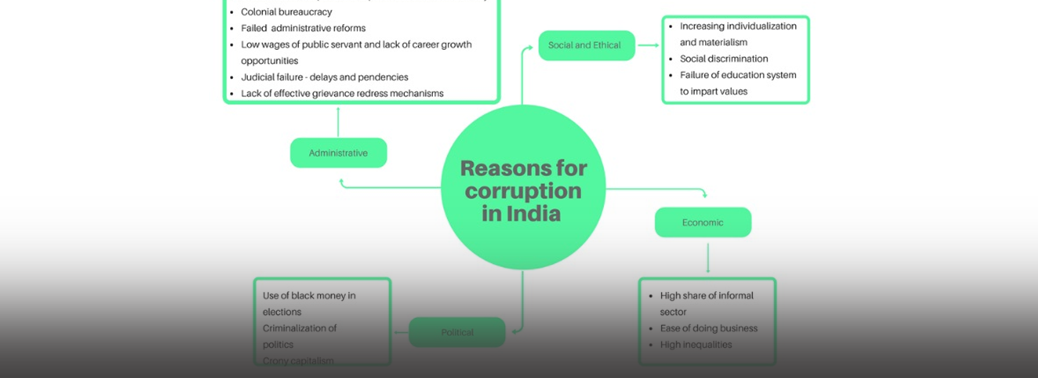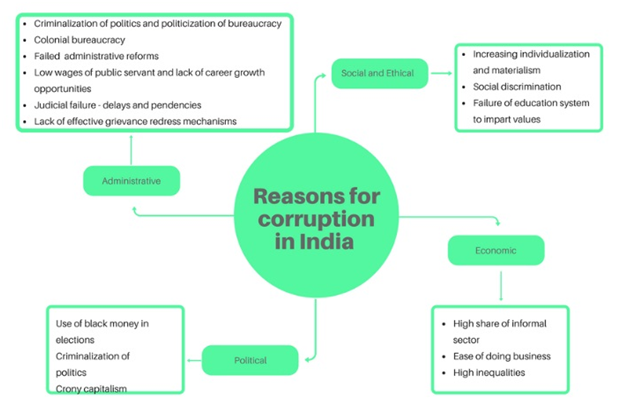Corrupt public servants must be declared anti-nationals: High Court
29, Mar 2019

Prelims level : Polity / Governance – Supreme Court
Mains level : GS II - Important aspects of governance, transparency and accountability, e-governance- applications, models, successes, limitations, and potential; citizens charters, transparency & accountability
The Madras High Court wished the battle against corruption wins and the corrupt get declared anti-nationals because they obstruct the development of the country.
Bureaucracy and Corruption:
- Criminalization of politics and politicization of bureaucracy presents the perfect cocktail for the misuse of state power. Example of honest officers being witch-hunted like Ashok Khemka and Amitabh Thakur are the indicators of the bigger malaise. Misuse and lack of autonomy for enforcement authorities like CBI, ED, IT-Dept, ACB also undermines the deterrence value of the law
- Colonial bureaucracy: The bureaucracy essentially remains colonial in nature characterized by 19th century laws e.g. Police Act 1861, complex rules, wide discretion, secrecy, moral responsibility devoid of legal accountability and the ivory tower attitude
- Failed reforms:Lack of political will and resistance from within the bureaucracy has led to failure of major reforms like citizen charter, RTI and e-governance.
- Low wages: The remuneration in the public sector remains below par with the private sector along with poor career growth opportunities for those working at the lower levels and harsher working conditions.
- Judicial failure:The judiciary has failed to bring to book the corrupt officials including politicians. The excess protection provided under Article 309 and 310 of the constitution to the civil servants and need of taking the government permission before the prosecution of civil servants further compounds the problem.

Legal Steps
-
Prevention of corruption Act 1988
- Provides a definition for corruption and lists out the acts which would amount to as corruption such as bribes, gifts for favors etc.
- Seeks to create a balance between need to bring corrupt to the books and protect honest officers. Prosecution of an officer requires sanction from the government
- Includes employees of the central government and the union territories, the employees of public undertakings, nationalized banks etc.
- Special judges are appointed for trial under the act who can order a summary trial in appropriate cases
-
Benami property Act 1988
- Recent amendments have widened the definition of the benami property and allow the government to confiscate such properties without any hassles of court approvals
-
Central Vigilance commission Act 2003
- Gives statutory status to CVC. Central Vigilance Commissioner shall be appointed by President on recommendation of a Committee consisting of the PM, MHA and LoP in LS
- Covers AIS officers, Gazetted officers of center, senior members of the PSB banks etc.
- Commission, while conducting the inquiry has all the powers of a Civil Court
-
Right to Information Act 2005
- Makes disclosure of information a legal right of the public to promote transparency
- Section 4 mandates proactive disclosure of the information and digitization of the records
- Many RTI activists have used it to bring out the irregularities in the functioning of the public authorities e.g. Vyapam scam of MP
-
Whistleblower protection Act 2014
- More than 60 RTI activists have been murdered and many more assaulted due to lack of protection
- WPA accords special protection to the people who disclose the acts of wrongdoing in the government. Provides anonymity and protection from prosecution under acts such as Official secret act 1923
-
Lokpal and Lokayukta Act 2013
- Appoints an independent authority Lokpal at center and Lokayukta at states to probe into the complaints of wrongdoing by the public servants
- Lokpal will be appointed by committee consisting of PM, LoP, CJI, Speaker and an eminent jurist.






